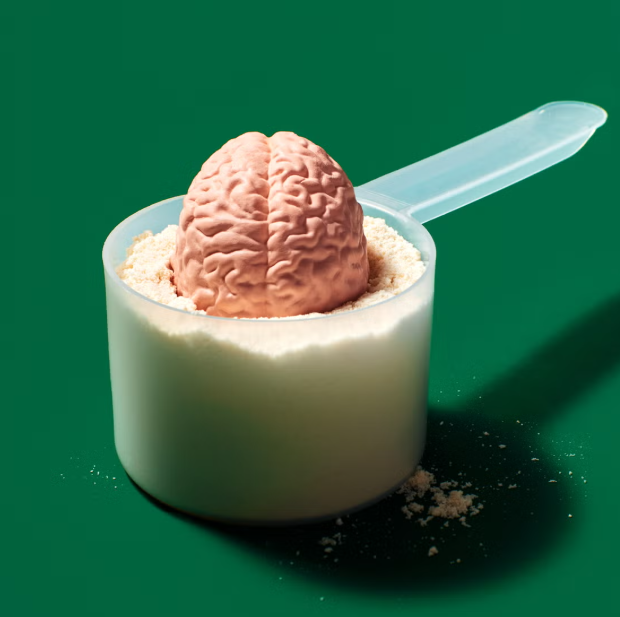CREATINE IS ONE of the most-heavily researched supplements out there. From improved strength and athletic performance to boosted cognitive function, there are plenty of proven benefits, with common advice suggesting you need just 3-5g of creatine per day to reap the rewards. But what happens when you super-load it over the course of 28 days?
As someone who regularly takes a scoop of 5g with their protein shake every day, I expected two, max three, scoops were needed to properly load so aggressively over the course of a month. So, I must admit, it came as a shock when I was initially told how many grams I’d be consuming. Twenty-eight days later and I had been guzzling down 25g every 24 hours. It wasn’t pretty at times, with the gritty texture difficult to stomach, but I just about managed to scrape my way through.
Despite my shock, super-dosing creatine was certainly intriguing – how would I feel after a month? And, more narcissistically, how would I look? (Fortunately, studies debunking the substance’s tendency to accelerate male pattern baldness allayed my fears on that particular subject years ago). Well, I put the supplement to the test to see what effects – if any – there really were.
How creatine affected my strength
Whether placebo or not, my performance in the gym improved almost immediately. It’s not like I suddenly became Arnold overnight, but it certainly felt as if my muscles had a lot more oomph behind them, with the saturation helping me to push and pull with more force than I had experienced in the days before. Then, after a week, things really started to ramp up.
Having just come off the back of a two-week holiday and an intense training block getting ready for a marathon, training generally, but weightlifting specifically, had spent a bit of time on the back burner as I rested, recovered and reset. I expected it to take time before returning to previous intensities, weights, and rep ranges, but the creatine accelerated that process, bringing back lost strength after just a few sessions. The dreaded DOMS (delayed onset muscle soreness) also had less of an impact, with recovery becoming a whole lot easier. And not just from the gym: one tempo run had my legs feeling shot by the end, but a few hours later the deep burn of fatigue that had gripped my thighs had made itself scarce.
It must be noted that, especially when it came to leg days in the gym, I arguably didn’t hit them with the right intensity at the start of the load, for fear of falling foul to the scary DOMS beast – I’m just a timid man who values walking up stairs normally.
What about the brain?
Not to overstate this aspect – though, as previously stated, I was coming off the back of a period of limited training – when I am feeling weaker than I like to be, my motivation to train wanes. It then gradually returns as soon as I notice the clear improvements happening. Again, creatine managed to accelerate this process, helping improve my drive to wake up early and get to the gym.
I also had a lot more motivation to do things generally. A Sunday morning around the start of the load began rather sluggishly (it couldn’t have anything to do with the beers, could it?), but the creatine seemed to provide a noticeable boost in my mental capacity, helping me to think clearly and coax myself into action. Prior to this load, whenever I was hungover, I would rot on the sofa and barely move all day; but a week in to this experiment I felt such a shift that I easily managed to touch grass, complete a food shop and meal-prep for the week. Now, that could all be placebo, but I’m willing to trust the creatine.
Cognitively, I didn’t notice much of a difference. Sometimes I operated slightly sharper, but it’s tough to conclude if that’s just a day-to-day thing rather than a benefit of creatine.
There were some issues…
One thing that immediately became apparent during this process was that taking all 25g of creatine in one go was not only disgusting, but messed with how I felt. On the first day I developed a pretty debilitating headache that became difficult to get through for a few hours. I learned my lesson, though, splitting the dosage into smaller, more manageable hits so that I didn’t suffer in the same way. Spreading the dosage out in five separate 5g scoops worked the best, but for ease of consumption I largely stuck to a 10g/10g/5g structure, which still helped with normal functionality.
Dehydration also proved a bit of an issue. Despite drinking as much, if not more, water than usual, I still found I needed to consume increasing amounts of liquid. That proved easily rectifiable, but something that I became acutely aware of across the 28 days.
Bloating – what bloating?
Not to spoil things too much, but I didn’t suffer from any GI (gastrointestinal issues) over the course of the super-dose. And while creatine can cause bloating due to increased water retention in muscle cells, I can rather smugly say that I experienced no such problem – if anything, my stomach felt better.
My key performance indicators
Three key performance indicators formed the basis of the load, helping to track and view any noticeable progress, including: max-rep push-ups, max-rep pull-ups, and a general memory test. In all three areas there were clear improvements, giving reason to suggest that creatine loading has been a rip-roaring success.
In week one, I could manage 41 push-ups unbroken before needing a break – just a few weeks later and I had repped out 47 on the sweaty gym floor. A similar story happened on the pull-up bar: having achieved 19 in the first week, that number rose to 22 in the fourth. A 15% increase in that time frame for the difficult bodyweight exercise is staggering, but that’s not to say the same results wouldn’t have happened with just a regular 5g dose of creatine.
My memory, notoriously average according to my girlfriend, fared better through supplementation as well. Attempting a basic memory online memory test, whereby I had to recall which word completes a pair in a sequence previously provided, my first-week score of 20/36 correct answers rose to 24 after four weeks.
I also tracked other movements more broadly, having included them consistently in my workouts. In terms of the weights I could manage in week one to week four, my squats increased from 80kg for 10 reps of 3 sets to 100kg for 6 reps of 3 sets; bench press from 77.5kg for 8 reps of 3 sets to 80kg of 10 reps of 3 sets; Romanian deadlifts from 60kg for 8 reps of 3 sets to 70kg for 8 reps of 3 sets; shoulder press from 40kg for 10 reps of 3 sets to 45kg for 8 reps of 3 sets; and bent over rows from 60kg of 8 reps for 3 sets to 65kg for 8 reps of 3 sets. Running faster and at lower heart rates also became easier, through both a mixture of natural improvements and creatine aiding in recovery.
Is a creatine super dose worth it?
It’s fair to assume that super-dosing creatine had an overall positive benefit. From feeling stronger and better rested, to more motivated and sharper, the supplement worked its wonders for the month. Regardless, I personally believe such an aggressive load isn’t quite worth the tradeoff of having to power through scoop after scoop on a daily basis. Instead, I think intensifying the recommended 3-5g daily dose with intermittent periods of three or seven-day super dose could provide incredible benefits while being much more sustainable. But that’s just me.
What does the science say?
Dr Sinead Roberts, a performance nutritionist, had this to say on the subject of creatine dosing: ‘Although historic research used doses of 3g or 5g per day, more recent work recommends a body size-dependent dose of 0.1g per kilogram of your bodyweight per day. This appears sufficient for maximising the effects of creatine on muscle, potentially also bone, and to get at least some creatine into the brain.’
She adds that, while there are certain situations where a short-term higher dose may benefit the brain – ‘such as after acute sleep deprivation, or traumatic brain injury’ – in a healthy, well-functioning brain, ‘it isn’t yet clear whether the optimal doses is more, less or the the same as for muscle. More research is needed.’
This article originally appeared on Men’s Health UK.
Related:
Creatine can boost the benefits of therapy in treating depression















